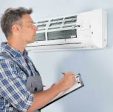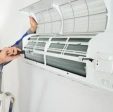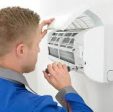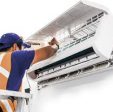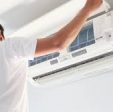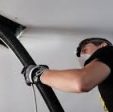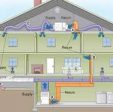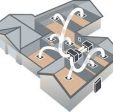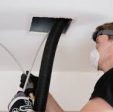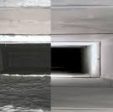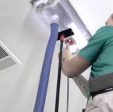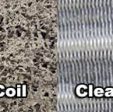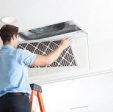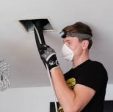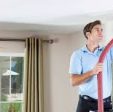What’s involved in an AC service?
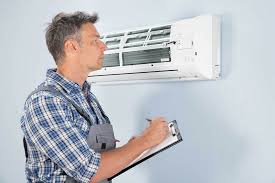
Air conditioners need to be serviced and maintained to ensure that they are operating effectively and efficiently. The general industry recommendation is to have your air conditioner serviced once a year, with the best time to do so is during spring, before the hot summer months. Maintaining your air conditioner and having it serviced on a regular basis ensures that it provides you with optimal performance and reliability. A well-maintained air conditioner runs more efficiently, has a prolonged overall life span, and saves you valuable time and money
The quality of an air conditioning service is dependent on the technician, however there are standard checks that reputable and licence air conditioning companies and technicians should perform. A service provided by a professional and licenced air conditioning technician should include the following checks and tasks:
The technician should check the thermostat to ensure that it is working properly as well installed correctly and located away from any heat source, like a light bulb.
- Electrical Connection Checks
As part of the service, a technician should inspect the electrical connections and ensure that they are working properly. Electrical connections may need to be tightened and checked for any potential electrical hazards, helping to improve the longevity of the air conditioning system.
- Check and Oil Moving Parts
By oiling any moving parts, the technician is avoiding unnecessary damage to the air conditioner. Without lubrication, the moving parts may cause friction and cause them to breakdown quickly, requiring more frequent repair or replacement.
- Check and Unblock Drain Line
By checking and unblocking the condensation line allows your air conditioner to properly drain any water. A clogged drain line may cause water leakage and moisture issues, like mould. The condensation drain can be flushed and treated with anti-algae solution as well as checked for any cracks or holes and be repaired if necessary
This involves checking that the system is starting up, operating, and turning off properly. The check will also include checking operation of the unit in both heating and cooling modes and the technician will also be on the lookout for any strange odours or noises
- Clean or Replace Air Filter
Even though cleaning or replacing an air filter is something that you can do by yourself, with the help of the Owner’s Manual, a qualified and knowledgeable technician may be able to provide further advice. Professional advice regarding recommended type of filters, may help you ensure that your system runs better and provides you with fresher and cooler air.
The duct work in the ceiling or walls should be checked for a build-up of dirt and dust and as well whether there is appropriate air flow coming through the ducts
The gas pressure of the air conditioner should be tested and checked for leaks and cracked heat exchangers inside the system. The technician can also check the refrigerant by monitoring the operating pressures.
The external unit should be checked to ensure that the fan motor is cleaned from dirt and debris and that there is no vegetation around the unit. An inspection of the condenser coil, inside of system and fan motor should also be completed
When to service your AC?
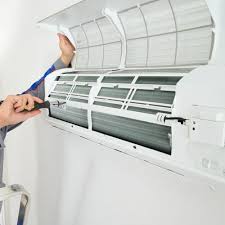
Regular maintenance and servicing of your air conditioner can save you time and money. Here are some tips to ensure that your air conditioner will be ready to use, whenever you need it
When is the Best Time of the Year to Service an Air Conditioner?
A general industry recommendation is that home air conditioners should be serviced at least once a year, with springtime being the best time to do so. However regular maintenance is also necessary, to ensure the air conditioner works efficiency and effectively.
Can you perform regular servicing and maintenance by yourself or should you call an air conditioning expert? See below to find out!
How to Service Your Air Conditioner by Yourself
You do not always need an air conditioning professional to service your unit. There are a few things you can do by yourself before calling in a professional.
- Clean or Change the Air Conditioner Filter
One of the most important maintenance tasks for your air conditioner is to clean or change the air filter. In most cases, you will not need an expert.
First, locate your air conditioner’s filter slot and slide out the old filter, taking note of which side the filter needs to face. With some air conditioners it is possible to clean the filter under cold water and then thoroughly dry it before returning it to original position. However, some filters will need to be replaced, with a new one inserted into the filter slot. Please refer to your air conditioner’s owner’s manual or manufacturer’s instructions, to find the required filter size and the steps for replacing the filter.
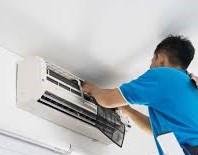
Changing an air filter on a split system
Are you wondering which type of filter to buy or how often you should change the air filter? Unfortunately, this is not a simple answer as it is dependent on your lifestyle and needs. Pets in the home, or people with allergies impact which type of filter is best and how often to change it. Air conditioning filters come in a range of ratings, based on how filtered you need the air to be. They also need to be changed at different times. For people with pets, they may consider replacing or cleaning their air filter every month, as well as installing a high rated filter, which filters the air more. This may also apply to families with members with allergies. At a bare minimum, filters should be changed or cleaned every 90 days.
- Spring Cleaning Your Air Conditioner
Once a new filter has been installed, a few more things can be checked and cleaned, like the indoor vents, from time to time. Bleach mixed with water or vinegar can be poured down the drain of the external unit to prevent mould building up and clogging the drain.
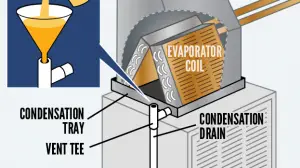
Unclogging the drain of the external unit
With the external unit, it is important to ensure that the unit is sitting on a level surface, with no debris around it or clogging it up. Generally, a half a metre clearance around the unit is a good start. Please ensure also that it has quality insulation around the refrigerant lines. For your own safety, do not attempt to open the external unit. If the unit requires further cleaning or the unit needs to opened, it is best to call in an expert to complete the maintenance.
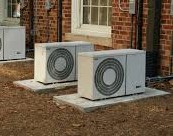
External units installed on flat surfaces, free from foliage
- Check the Air Conditioner’s Performance
It is good from time to time to check the performance of your air conditioner. Power the system up to a high level and assess how it performs. Is the home getting cooler? How noisy is the unit? Is it operating normally?
If you are turning on your air conditioner for the first time in a long time, you may notice a smell. Do not worry! It’s usually due to the air conditioner clearing out all of the dust that may have settled since its last use. It will disappear quickly.
When to Call the Experts?
If you are turning on your air conditioner and you notice strange noise or the air is not cooling, it is probably time to call an air conditioning technician. It best not to leave it too long, as sometimes more damage can be done in the meantime.
If your home air conditioner needs repair or replacement, make sure to check your warranty to see if your system is still protected.
Does your air conditioning unit need a service, or would you just like to know more? Please call our friendly Compare Air Conditioning team on 1300 741 451.
Why hire a professional to service your AC?
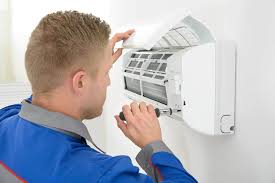
Air conditioners are considered an essential home appliance, as they ensure the comfort of home occupiers all year around. Over time air conditioning units develop faults and issues, which can reduce their efficiency. Getting your air conditioning unit serviced is a sure way to ensure your air conditioning unit receives proper maintenance and it is ready for you when you need it most. By booking a regular service for your air conditioner can reduce the repair and maintenance costs in the long term, with the unit running at an optimally effective and efficient level.
To save on costs and to ensure that your air conditioner is properly maintained, you will need to employ the services of a professional air conditioning technician. Proper servicing can only be provided by licensed experts who are knowledgeable and skilled in this field. What are the key benefits of hiring an air conditioning expert? Read on below to find out more!
The Key Benefits of Hiring an Air Conditioning Technician
- Promotes Efficiency and Longevity
Air conditioners are made up of various complex and functional parts, which require a significant amount of skill and technique to understand and work with. An average person may make errors whilst trying to service the air conditioner, which may damage the unit. A professional repair service company or technician can perform a thorough service and maintenance check of your unit. They will be also able repair any issues, restoring your machine to its initial performance and efficiency.
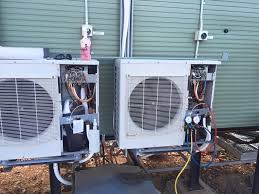
- A Guarantee on the Service and Repair Workmanship
If you service your air conditioner by yourself, there is no guarantee of the outcome. As a matter of fact, an unprofessional service may cause the unit to deteriorate faster and then cost more money, time, and effort. By using an air conditioning expert, you can be guaranteed with quality workmanship, as they have the expertise and knowledge to get it right.
Professional air conditioning repair companies usually offer a warranty on their repairs, which covers against damages and repairs, as outlined in the warranty terms for a specified time-period. If the same repairs reoccur within the timeframe, the company should repair the issue, without any further costs.
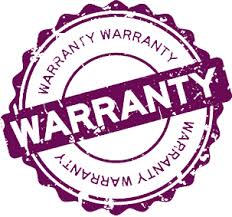
- Correct Refrigerant Levels
A key service check of an air conditioning unit is checking its refrigerant levels. The refrigerant circulates through the air conditioning system and pulls heat out of the home, releasing it outside. Refrigerant levels need to stay at a fixed level in your system to work effectively. Professional air conditioning technicians use specialised tools and techniques to ensure that your air conditioner produces optimum benefits and to locate and repair any refrigerant leaks. Refrigerant is extremely dangerous and there are many laws governing its use. It must be handled by a professional, who is licensed with a Refrigerant Handling License, as seen below.
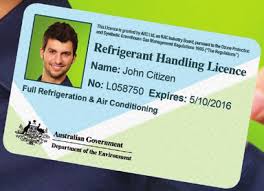
- Expert Knowledge and Skills
A professional air conditioning technician possesses a wide array of experience as well as knowledge regarding different kinds of air conditioners. This is one of the major benefits of hiring professional air-conditioning technician. Repairing air conditioning units require a particular degree of expertise, in which the average homeowner does not have. Even with the help of a DIY guide or YouTube videos, you cannot be sure that you performed an effective service. Air conditioning experts handle a wide variety of air conditioning problems daily, using the best equipment, methods and techniques to resolve the issues and prolong the life of your air conditioner.
Even a tiny mistake whilst trying to service your own air conditioner can end up leading to damage and the unit needing repair. A DIY service may also end up creating problems in terms of energy consumption, which would lead to higher utility bills. If there are any kind of mistakes which lead to leaks or energy loss, they will not be visible until your utility bills come through. Employing a professional air conditioning technician will give you the piece of mind that everything has been serviced correctly.
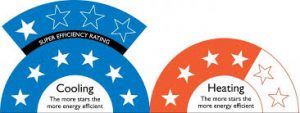
There are a lot of hazards that are associated with doing your own air-conditioning service and maintenance, that you might not even realise. Whilst trying to save yourself extra money, you may put yourself in harm’s way. A reliable air conditioning technician comes fully equipped, with the necessary safety measures to fix your unit. Also, they handle your unit properly averting any damage to the unit.
- The Right Tools and Equipment
There are a lot of specific tools that are used for the servicing and maintenance of an air conditioner, which you might not have access to. Therefore, when you hire a professional, you can be certain that they will have the right tools and equipment that are needed to get it done right.

A well maintained and serviced air conditioning which is operating effectively will provide you with better air quality in your home. Therefore, an air conditioning service performed by a professional will make ensure that you have access to cool, clean, and fresh air.
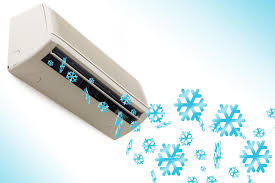
Air conditioner servicing and repair is one of those tasks that cost less when undertaken by experts. If you try to fix the issue on your own, you may make the problem worse, which will cost you more money over time. By outsourcing the servicing and maintenance, you can save time and money on potential future problem with your air conditioner.
- Free Maintenance and Advice
Most air conditioning companies will offer free tips on maintaining the unit. Regular maintenance also lengthens the life expectancy of the unit. Professional technicians will check everything before advising you on how to keep your air conditioners well maintained. They can even give you operating advice and tips during their service call out, which can be invaluable information for homeowners.
Does your air conditioning unit need a service, or would you just like to know more? Please call our friendly Compare Air Conditioning team on 1300 741 451.
Getting AC ready for summer
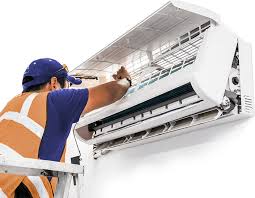
As summer approaches its time to start thinking about one of your major home appliances, your air conditioner. If your air conditioner has a heating option, you probably have been using it also during the winter months. However, for homeowners with a cooling-only air conditioner, their unit has been sitting idle since last summer, may need a pre-service.
Regular maintenance and servicing for your air conditioner is essential for effective operation, a healthy home environment and lower running costs. If you are willing to take the risk and not have your system serviced, you may be stuck in the middle of the summer heat, with an unmaintained unit, possible repair costs, higher energy bills, inadequate cooling or having to replace the whole air conditioner itself.
The one question that is always asked, is whether homeowners can service their air conditioner themselves or do they need to employ an air conditioning specialist. Whilst some simple cleaning and maintenance tasks can be performed by homeowners, like cleaning the air conditioner filters. However, most other tasks will require the services of a licensed and certified air conditioning technician.
Employing the Services of an Air Conditioning Technician
Having a licensed and certified technician look over your air conditioning unit at the start of the hot season is a good idea. Their technical know-how, with the right tools can help you take care of your air conditioner and keep it operating effectively, as well as identifying problems before they become bigger. Generally, as a part of their service and maintenance routine, an air conditioning technician will:
- Check and clean the air conditioner condenser and evaporator coils;
- Check the refrigerant charge (any repairs to the seal refrigerant system should only be undertaken by a professional and licensed technician. This is never a task you should do by yourself);
- Check and tighten electrical connections;
- Check and flush drains;
- Check, clean and repair the ductwork, if necessary;
- Check, clean or replace air conditioner filters; and
- Perform a general inspection of the air conditioning unit and recommend any repairs to ensure the best operating efficiency and lifespan of the unit.
What Can I Do to Get My Air Conditioner Ready for the Summer Months?
If you feel confident in doing some tasks yourself, there is a lot that you can do. First, it is important to know the type system you have, read the instruction manual, familiarise yourself with the important parts of the units or to speak to an expert to get some tips.
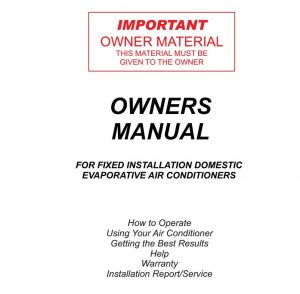
An example of an Owner’s Manual for an air conditioner
Some basic information to get you started, can be found below.
- Basically, a central or ducted air conditioner has two main system units, the condenser unit which is located outside and an evaporator unit which is usually located inside. These systems work together to extract heat from the space and then blow chilled air through ductwork into each of the rooms in the home.
- Air conditioners also have filters which filter the air from dust and dirt. They can be easily removed from the internal unit and cleaned or replaced.
- Air conditioning ducting are round tubes which are generally located in the ceiling and distribute the cooled or heated air to all the rooms in the house.
- The air conditioning thermostat is a small box located near the internal unit, which regulates the temperature inside the home, to the set temperature.
- Air conditioning registers are grilles, with moving parts that are in the ceiling or floor and send air into a room.
Safety is Always Paramount
Maintaining your personal safety is most important. Before starting any kind of maintenance on your air conditioning unit, always make sure to turn off the power supply. There should also be a 240-volt weatherproof isolation switch, located near the external unit, which should be turned off as well.
The external unit holds a capacitor which stores an electrical charge and can be a safety issue for non-experts. You should allow 30 minutes for the charge to stop before beginning any maintenance and refrain from touching any of the electrical components, as a safety precaution.
Clean or Replace Filters
Cleaning or replacing the air conditioning filters is one of the most important tasks in servicing your air conditioner and should be done on a regular basis, generally once a month through the summer. Some air filters are disposable and need to be replaced. Whilst some air conditioners have reusable filters which can be cleaned with cold water and dried thoroughly, before being put back into place. Make sure to check the air conditioners owner’s manual to find out where the filters are located, how many there are, and whether are they disposable or replaceable.
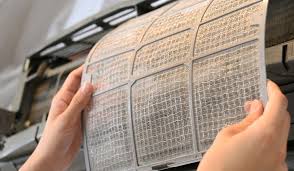
A dirty air conditioner filter which will need cleaning or replacing
Clean the Condenser
Another name for an external unit of an air conditioner is condenser unit, which is basically a large fan inside a metal box. To service the condenser unit is really to ensure that nothing is blocking it, like dirt, debris, or foliage, which can affect its operation. Usually you will find some leaves or plants or dirt inside the condenser or the external vents, which can cause both damage and for the unit to run inefficiently.
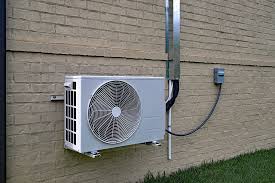
The external or condenser unit
Check and Clean the Ductwork
Ductwork is basically the vents that are in ceiling or walls and that circulate the cool air around your home. Any servicing on the ducts should be performed by a professional air conditioning technician. A technician will check for any holes in the ducts and repair them. Without repair, the holes in the duct work can reduce your air conditioners capacity to operate effectively and cool the home and may increase the running costs.
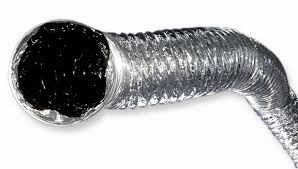
An example of ductwork located in ceilings or walls
What you can do with the ductwork? You can wipe down the visible parts of the ducts or vents, to keep them clean. Also check the ductwork regularly for wear and tear or water damage is also helpful. Air ducts can accumulate moisture, which can damage the system or lead to mould growing. If you do see water damage or mould, it is time to call in an air conditioning professional.
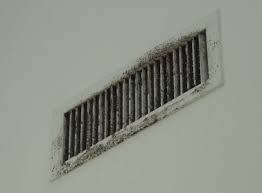
A dirty air conditioning vent
Is your air conditioner summer ready? After performing all the above checks, replacing or cleaning the filters and bringing in an air conditioning professional to perform a service, your air conditioner should be ready. Try it! Feeling that cool breeze? Enjoy, you and your air conditioner are ready for the summer heat.
Is your air conditioning unit in need a service, or would you just like to know more about getting your air conditioner ready or summer? Please call our friendly Compare Air Conditioning team on 1300 741 451.
Maintaining your AC

Air conditioners require regular maintenance to ensure that they operate efficiently and effectively. The air conditioning filters, coils and fins need to be serviced from time to time, otherwise there may be a decrease in the unit’s ability to maintain the required temperature, with an increase in running costs,
Air Conditioner Filters
Air conditioner filters remove smoke, pollen, dust and grease to ensure better air quality. Therefore, one of the most necessary maintenance tasks is to regular replace or clean the air conditioners air filters. Just through regular use, filters can become clogged and dirty, which then impacts on the air flow of the air conditioner. When airflow is obstructed, not only does it reduce the efficiency of the air conditioner, but also lets dirt through into the evaporator coil, which impacts on its heat absorbing capacity. By replacing or cleaning your dirty or clogged up filters, your energy consumption can be reduced by 5-15%.
For ducted/central air conditioners, the filter is normally located somewhere along the return duct’s length, such as in walls, ceilings or in the air conditioner itself. It may be useful to check the user manual of your air conditioner to help you locate the filter. Standard wall-mounted room air conditioners generally have a filter mounted in the grill facing the room.
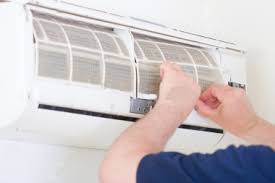
Air conditioning filters in a split system air conditioner
There are different types of filters and some can be cleaned and reused, however some must be replaced with a new one. As a general rule, air conditioning filters should be replaced or cleaned every month or two during the cooling season. However, the filter may need to be cleaned or changed more frequently if the air conditioner is being used constantly, the environment is dusty or if you have animals living inside the house.
Air Conditioner Coils
With air conditioning units, like split systems, there are coils located inside both the internal unit and external unit. The internal unit holds an evaporator coil or also known as a cooling coil, which removes heat from the air, allowing the fan can return cool air to the home. The external unit contains a condenser coil, which releases heat outside. Both coils play a crucial role in the cooling process, so by keeping them clean helps to ensure the long-term health of your air conditioning system. They both collect dirt over their months and years of operation.
A clean air conditioner filter will protect the evaporator coil from getting dirty quickly, however over time it will still collect dirt. The dirt reduces the air flow and covers the coil, reducing its ability to absorb heat. It is recommended to check the evaporator coil every year and to clean it as required.
The condenser coil in the external unit can also collect dirt if the outside area is dusty or it is located amongst vegetation. The condenser coil can be easily seen inside the external unit, so it is possible to check whether dirt is collecting on its fins. Minimising the dirt and debris around the external unit, helps to reduce the dirt being collected and to enhance the unit’s performance. To reduce dirt collecting, the area around the external unit can be cleaned and any debris removed. Trimming any vegetation around the unit, to at least half a metre away, will allow adequate airflow around the unit.
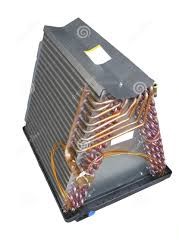
Air conditioner evaporator coil
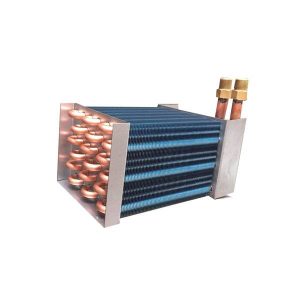
Air Conditioner Condenser coils
Coil Fins
On both the evaporator and condenser coils there are aluminium fins, which can be bent easily and may block airflow through the coil.
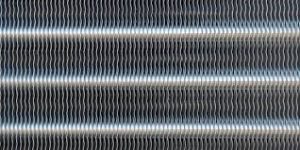
Air conditioner coil fins
There is a tool called a fin comb, which can comb the fins back into their original positions and can be bought from your local air conditioning wholesaler.
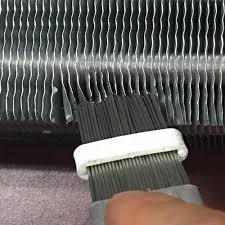
Cleaning coil fins using a Fin comb
Condenser Drains
Condenser drains can become blocked or clogged. Regular maintenance by using a stiff wire to pass through the drain channels can unblock the drains or reduce the build-up. Clogged condenser drains can result in the unit not being able to reduce the humidity properly and may leave excess moisture, which may discolour the walls or carpet.
Window Seals
When using a room air conditioner, it is recommended at the start of the cooling season to inspect the seals around the unit. Room air conditioners are generally positioned in a window frame and are sealed around to stop any air flow in or out. When inspecting the seals, it is important to ensure that the air conditioner and window frame are making contact. Over time, moisture can damage the seals, allowing cool air to escape.
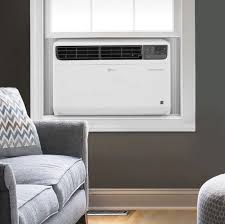
A room air conditioner installed in a window
Winter Preparations
Protecting the air conditioning unit from the environmental elements, is also important in maintaining the longevity of the unit. A room air conditioner can be covered or removed during the winter months. The external unit of a central air conditioner can be covered to protected from the winter elements or any debris.
Professional Air Conditioning Maintenance and Servicing
If you air conditioner needs more than a basic maintenance or servicing or you do not feel comfortable doing it yourself, look to hire a professional air conditioning service technician. A trained and certified technician will be able to service your air conditioner to a high standard and identify any problems and fix problems in your air conditioning system.
The best way to get optimum performance out of your air conditioner is to have it serviced regularly, at least once a year. Generally, during an air conditioning maintenance and service the technician will inspect of key components of air conditioning unit like the compressor, fan motor, evaporator unit, condenser unit and thermostat. Some of tasks involved in a service include;
- Refrigerant level check;
- Refrigerant leak test, using a leak detector;
- The use of safe refrigerant handling techniques such as capturing any refrigerant released from system during service. It is illegal to release the refrigerant directly into the air;
- Sealing any duct leakage in central air conditioning systems.
- Check airflow through evaporator coil;
- Check of the electric control sequence and ensure the heating and cooling system cannot run at the same time;
- Measure accuracy of the thermostat;
- Oil the motor and check belts for tightness or any wear and tear; and
- Check electrical terminals, clean, and tighten the connections as well apply a non-conductive coating if needed.
Want to know more about servicing and maintenance or are you looking at booking a service for your air conditioner? Get in touch with our friendly Compare Air Conditioning team on 1300 741 451 or Request a Quote Now.
Signs your AC needs servicing
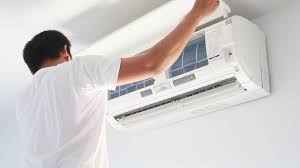
Air conditioners are essential home appliances which provide you with comfort in your home all year round. Regular servicing of your air conditioner is necessary to ensure that it is operating efficiently and effectively, with the general recommendation of having it serviced at least once a year. However, there are times where your air conditioner may need servicing outside of the regular scheduled maintenance check
Air conditioners can still break down, even if it has been maintained and serviced regularly. There are some key signs which may mean that your air conditioner needs servicing and if ignored, the problem may become bigger, without professional attention. Call in your local air conditioning specialist as soon as you notice something not right, so that it can be repaired, before it stops completely when you really need it or it gets damaged further.
Below are 5 signs which may mean your air conditioning unit is not operating effectively and requires professional attention.
- Not Blowing Cool Air
One of the biggest indicators that your air conditioner may need a service is if the air coming from the vents is not as cold as it used to be. If the unit is not blowing cold air, even on the maximum setting, can indicate a problem with the compressor, or low refrigerant levels.
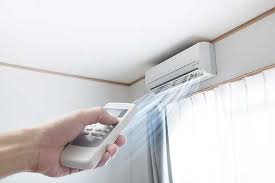
- Limited Airflow
If you find that air is not circulating or flowing throughout the house, then you may need to call a professional. There are several reasons why this problem can occur, such as dirty filters, blocked ducts, or a failing compressor. The ductwork can become blocked by dirt and dust in the vents and regular use of the air conditioner can cause wear and tear on the compressor.
- Bad Smells or Strange Noises
Is there a bad smell coming from the unit when in use, or can you hear an unusual noise as it is operating? These are both signs that your unit may need a visit from an air conditioning specialist.
Any strange smell coming from your air conditioning indicates a problem, as your air conditioner should be odourless. Sometimes when switching on your air conditioner on after prolonged non-use, there may be a smell due to the dust build up, but it should disappear quickly. A burning smell may be caused by burnt wire insulation or a foul odour may indicate mould growth in the duct work. Contaminated air from mould can be highly toxic and may cause health issues for family members. Both need to be checked by a professional air conditioning technician, who will be able to make the appropriate repairs as soon as possible.
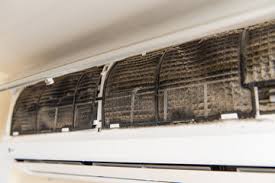
Mould build up in an internal unit of a split system
A well maintained and fully functioning air conditioning unit should be near quiet when in operation. Minor noises could indicate loose parts, a build-up of dust or dirt or that the fan is loose. Loud metal squealing, grinding or grating sounds could indicate more serious issues and will require an inspection by an expert. The system should be turned off right away to prevent further damage.
- An Increase in Temperature
An increase in temperature may be a sign that the air conditioner has a dirty coil, damaged electrical components, broken motor fan, or a refrigerant leak. You should not try to repair the unit on your own and instead, call in an expert to do it for you.
- Leaks
Any irregular leaks can indicate a problem with your air conditioner and needs attention from an air conditioning expert. It is important to deal with these issues early before they become more serious and lead to more expensive repairs.
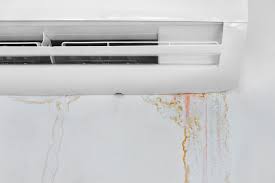
Water leaking from an internal unit of a split system
Some air conditioning units will have a small amount of condensation or water leaking on the outside of the unit, which is normal. However, if you notice water leaking from the unit, it could mean a clogged drainpipe. Even though it is not as dangerous as a refrigerant leak, it can cause bigger problems. Ignoring the leak can lead to the growth of mould within the system and can be highly toxic.
If it is refrigerant leaking, action needs to be taken straight away, as it is potentially dangerous to humans and animals.
To ensure that your air conditioning unit is running efficiently and effectively all year around, regular servicing and maintenance by an air conditioning professional is required. Regular servicing and maintenance can increase efficiency and the lifespan of your unit. However, if the air conditioning unit has been neglected, requiring multiple repairs, or is outside of its warranty protection timeframe, it probably would be more economical to replace the unit entirely.
If you have noticed any of these 5 signs that your air conditioner may need repair, it is advised to contact your local professional air conditioning repair company. If you want to find out more or want to speak to one of our friendly Compare Air Conditioning team members, please call on 1300 741 451.
Benefits of cleaning your ducts
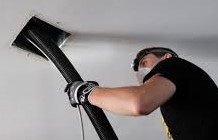
Air conditioning air ducts have a very important role in ensuring in-home comfort and healthy air quality. The air ducts circulate the air in and out each room in the house, so making sure the air is as clean as possible is critical. Cleaning your air ducts involves the removal of dust and dirt from the duct work, via a high powerful vacuum system.
There are many benefits to having your air ducts professional cleaned, with the top 5 listed below:
- Promotes a Cleaner Living Environment
Duct cleaning removes dirt and dust, which increases air quality. Having your air ducts professionally cleaned reduces the dust that would otherwise circulate throughout your home. Duct cleaning can also remove small animals like rats and mice or insects from the duct work and reduces the risk of fire, which can be caused by a build-up of dust.
- Reduces Irritants and Allergens in the Home
Duct cleaning can remove germs, mould, fungi and other harmful microbes, which can cause asthma, allergies and other related respiratory infections. People who suffer from allergies, asthma, and other respiratory problems are particularly sensitive to these airborne particles. A periodic air duct cleaning promotes healthier living conditions and reduce those irritants and allergens inside your home.
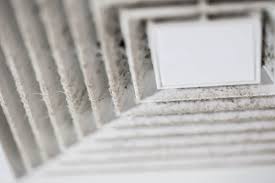
Mould growing on the air duct vents
- Helps You to Breathe Easier
Cleaner air makes it easier for everyone to breathe. Dust and pollutants entering the nose and lungs can trigger sneezing and coughing, as well as sinus and bronchial congestion. Air duct cleaning creates a more comfortable environment and promotes well-being for those in the home. A duct clean can help people breathe easier, especially those with allergies or asthma.

- Removes Unpleasant Odours and Smells
Duct cleaning can reduce the mustiness smell and odours, such as cooking smells and cigarette odour. Pets, household cleaning agents, mould, tobacco use and even food preparation all contribute to stale smells in the air ducts. Every time the air conditioner is running, these odours will repeatedly flow through the house. A build-up of dust and dirt over the years can lead to a musty scent coming from the ductwork. A detailed cleaning of the air ducts can remove odours and smells, resulting in a fresher smelling home.

- Improves Air Flow and Efficiency
A regular duct clean can reduce energy costs by up to 20%, by removing any heavy build-up of dust and dirt. This build-up can restrict the flow of air through the air ducts, so your air conditioner will have to work harder to heat or cool your home. A clean system will operate at peak efficiency and provide the most cost-effective operation.
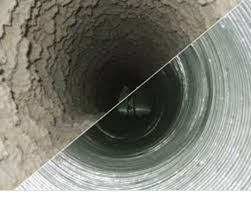
The difference between a dirty and a clean duct system
Want to know more about duct cleaning or would you like to speak to someone about booking a duct clean for your air conditioner? Get in touch with our friendly Compare Air Conditioning team on 1300 944 133.
How often to clean ducts
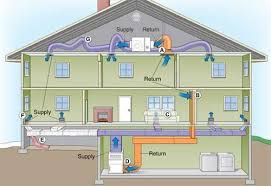
Most homeowners are unaware of how to properly maintain their central heating and cooling system. Central or ducted air conditioners have a network of pipes or duct that filters the air and distribute it throughout your house. If your air ducts become contaminated with dust, dirt or even mould, it can affect the overall running of your air conditioner. Cleaning your ducts can improve your indoor air quality and prevent problems down the line, which can cost you time and money.
1300 741 451
Recommendations between companies and industry representatives vary as to how often homeowners should have their air ducts cleaned. This is due to there being several factors which can influence the need for a ducted air conditioning system to be cleaned more frequently, such as:
- If there are people that smoke residing in the home;
- If there are pets living in the home, especially ones which shed a lot of fur;
- The air conditioning system or the home itself has water damage or contamination, which may lead to the growth of mould and fungi;
- There are people with allergies or asthma living in the home;
- The home is located in an area which is naturally dusty;
- Moving into a newly constructed/built home;
- Renovations or remodelling of the home has occurred; or
- Moving into a new home and there is no record of when the air ducts were last cleaned.
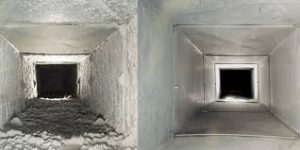
A before and after picture of an air duct which has been cleaned
With normal conditions, the general recommendation is to have your duct work cleaned every 3 to 5 years. However, for homes which require more frequent cleaning due to any of the reasons above, homeowners may choose to have their ducts cleaned every 18 months to 2 years.
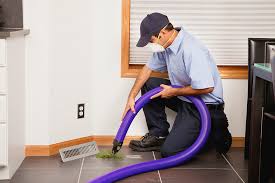
An air duct cleaning technician at work
Do my air ducts really need to be professionally clean?
There is debate around the importance of having air ducts cleaned, however just seeing pictures like the one below, of the build-up that can occur inside your duct work, may influence your opinion. This build-up can lead to dust and dirt being sent throughout your home when the air conditioning system is in operation and also limit the airflow through the air ducts.
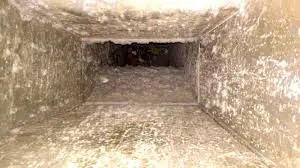
A dirty air duct
A professional duct clean can provide benefits to both you and your air conditioning system, such as:
- Limit the air pollution inside your home, by improving air quality;
- Removes all the dirt, dust and other contaminants, like mould and fungi from your duct system;
- Lower the running costs of the air conditioner, by improving the air flow through the ducts;
- Improve the efficiency and effective operation of your air conditioner;
- Extend the lifespan of your air conditioning unit; and
- Improve the health and wellbeing of the occupants of the home.
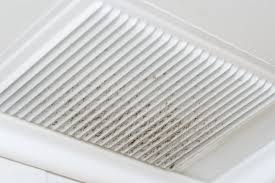
An example of a dirty register/air vent
Interested to know more about air duct cleaning or are you looking to book an air duct clean for your air conditioner? Get in touch with our friendly Compare Air Conditioning team on 1300 741 451.
How to decide to clean your ducts?
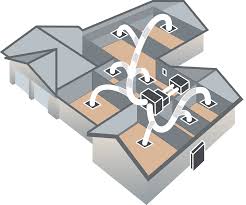
Ducted air conditioners work by sending fresh and cool air around your home through a series or ducts or piping which can be laid in the walls, ceiling or flooring of your home. These air ducts can become dirty over time with a build up of dirt, dust and other contaminants and can be cleaned by a professional air duct cleaning company.
There is still debate surrounding the actual need for duct cleaning and its potential health benefits. Every home is different, with the conditions within each home varying, so it is basically impossible to provide a blanket rule or generalised recommendation about what is necessary.
Homeowners can conduct an inspection of the inside of the ducts to see if they can find any evidence of dust or contaminants, like mould build-up in the duct work (noticing if there is any musty odour or visible mould) or be aware to any ongoing allergies in the household. If neither of these are not present, it is probable that a duct clean is unnecessary. Even if the registers (the air vents) are dusty, this does not mean that the air ducts contain a build-up of contaminants or dust. The registers can be vacuumed and cleaned easily by homeowners if needed.
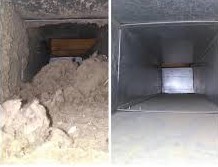
A before and after photo of a dirty air duct which has been professionally cleaned
However, you may decide to have your air ducts cleaned simply because it seems reasonable that the duct system will get dirty over time and probably could use a clean now and again. Even though there is some disagreement of how often a duct clean should be performed and the actual benefits of it, there is no evidence to suggest that a duct clean is detrimental to your air conditioner, providing that it is done properly by a professional.
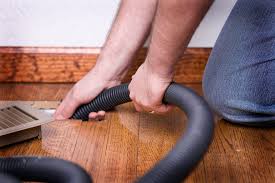
A vacuum system used during an air duct clean by a professional technician
An air duct clean which is not done properly can cause indoor air problems. An unprofessional or inexperienced technician can cause damage to the duct system, which may increase the operating costs or lead to the unit needing expensive repairs. Also by using unprofessional equipment in a duct system, like a regular vacuum cleaner can release more dirt and contaminants into the air.
What Can Make Air Ducts Dirty?
There are things that can build-up in your air ducts and cause clogging, odours and limited air flow, such as:
Moisture build-up in the air ducts can cause mould growth. If you find visible mould growth inside your air ducts or on other parts of the air conditioning system, a duct clean will help. However, if the mould is growing on insulated air ducts, which have a lining and is not just metal, it is impossible to remove the mould and these parts will need to be replaced. Also, the source or reason for the mould growth needs to be investigated and repaired, otherwise the mould will return.
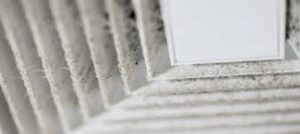
Mould present on the register (air vent) of a ducted system
Air ducts can also get infested with rodents or insects, so in this situation an air duct clean to get rid of the animals and their remnants is necessary. They may have even caused damage to the ducted system as well, which may require repair.
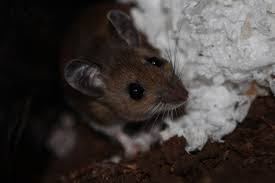
A mouse inside an air duct
Dust and dirt can also build-up in your air vents and excessive amounts can cause your air ducts to become clogged. This can limit the air flow through the ducts and send dust and dirt around your home.
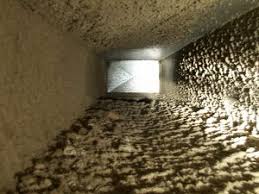
An air duct clogged with dust and dirt
What are the health benefits of having your air ducts cleaned?
Research does not prove that periodic air duct cleaning prevents health problems nor has it proven that cleaning the air ducts will completely improve the air quality in your home. Air pollutants in the home may also come from other sources and not just from dirty air ducts, such as cooking, smoking and cleaning.
The recommendation to have air ducts cleaned is still under debate, however a duct clean is not detrimental to your system and may actually bring benefits to your home and household. Air conditioning professionals also state that servicing and maintenance improve the efficiency and effective operation of your air conditioning system, like cleaning the cooling coils, fans and air filters.
If you have decided that an air duct clean may be a good idea for your home or you would like to speak to someone further about air duct cleaning? You may want to call a professional air duct cleaning company to ask about the services they provide or alternatively, please call our friendly Compare Air Conditioning team on 1300 741 451 to discuss air duct cleaning services in your local area
What is duct cleaning?
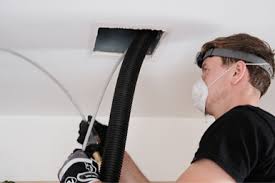
Are you interested to know more about air duct cleaning or you don’t even know what it is? Read on to find out more! Ducted air conditioners are common in workplaces, shopping centres and other large areas, but they have also become increasingly common in homes.
The ducted air conditioning system has a central unit where the air is treated, then sent by fans through a system of ducts into each room. These ducts can collect dirt and debris over time and may require cleaning. Air duct cleaning is where the pipes or the ducting, which are hidden in the ceiling or walls of the property, are cleaned from dust and debris.
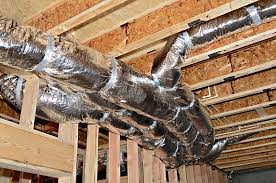
The duct work laid inside the roof of a new home build
How Can You Tell If Your Air Ducts Need Cleaning?
Not sure whether your air ducts need cleaning or not? Here are a few things to check or look for that may indicate that your duct work is dirty.
- The air filters have not been replaced or cleaned for a long time;
- The vent covers or registers are dusty or dirty;
- Mould is visible in or around the air conditioning system;
- The airflow coming from the duct in some rooms is limited; and
- There is noise coming from the ductwork when in operation.
If you notice any of these things occurring with your ducted air conditioning system, it may be time to call in a specialist duct cleaning company.
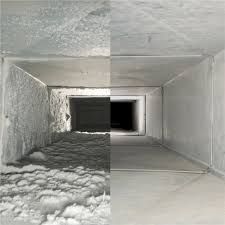
A before and after picture of an air duct that was cleaned
What Does Air Duct Cleaning Entail?
A routine air duct cleaning which is performed by a professional air duct cleaning company or technician may include such tasks as;
- Opening of all access ports to clean and inspect the whole air conditioning system;
- An inspection of the air duct system to ensure there is no asbestos containing materials, like insulation as this requires specialised asbestos contractors;
- Use professional vacuum equipment to remove all the dirt and debris from the ductwork;
- A brush may also be used to move stubborn dust and dirt alongside the vacuum system;
- If mould is found, a solution may be used to clean the air duct system from the mould. Many companies use a natural solution based on tea tree oil; and
- Check and reseal any access holes so that they are airtight.
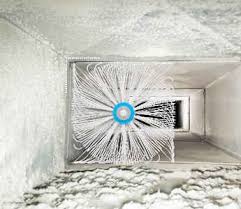
A brush being used to clean the duct work
How Do You Know if Your Air Ducts Have Been Cleaned Well?
The best way to see if you duct work is all clean is to inspect them, which is not easy to do. Some companies use remote photography technology to take pictures of the ducts after the clean, to show their customers. However, there are things which the air duct cleaning company should have completed in their visit and there are things you may notice, which indicate that the ducts have been cleaned, such as:
- The service technician should gain access to and clean the whole air conditioning system including all the duct work and components (drain pans, humidifiers, coils and fans;
- The surface of the heat exchange is clean;
- The cooling coils are clean;
- The coil fins are straight and not bent out of place;
- The coil drain pan is clean and draining effectively;
- The blower blades are clean from oil and debris;
- There is no dust or debris in the blower compartment or the return air plenum;
- The air conditioner filters are fitted correctly and are the correct type and size;
- The supply air plenum is free from moisture stains and contaminants;
- The interior duct work is free from dirt and debris;
- All of the fibre glass material is free from damage;
- The access door for the sheet metal ducts have been attached well;
- When the unit is in operation there should be little or no air leakage from the access doors;
- All registers, grilles and diffusers are clean and have been reattached correctly to the walls, floor or ceiling; and
- The system operates normally and effectively in both heating and cooling modes after the cleaning service has been completed.
How Can You Prevent Contamination in Your Ducts?
A good preventative maintenance program is fundamental in minimising duct contamination. This can involve:
- Preventing dirt from entering the system
- Use the most efficient air filter, which is recommended by your air conditioner’s manufacturer;
- Replace or clean the air filters regularly;
- When your system is maintained or repaired by an air conditioning professional, be sure to ask the technician to clean the coils and drain pans;
- If your home is being renovated, it is best to seal off all the registers and not use the air conditioner, until all work is completed, and the house has been cleaned from dust;
- Vacuum and dust your home regularly; and
- For air conditioners which have an in-duct humidification technology, homeowners should only operate and maintain it as recommended by the manufacturer.
- Protecting ducts from moisture: Moisture can enter the system if there is a leak and can cause mould growth in the air ducts. The cooling coils are designed to remove water from the air, but condensation on or near to the cooling coils can cause moisture contamination of the system. It can be difficult to control, but here are some preventative steps that can be taken:
- Have any leaks or water damage repaired as soon as possible;
- Ensure that the condensation pan drains properly or regularly check the insulation near cooling coils for wet spots;
- All air ducts should be properly sealed to prevent moisture entering the system; and
- If installing a new system, make sure the system is the right size for your needs as if the air conditioning unit is too big for the space, it cannot effectively remove moisture.
Can Duct Cleaning Promote Good Health?
There is no solid evidence to support this, however badly contaminated ducts may pose a risk to you and your family’s health. A contaminated duct system can send not only air around your home, but also other contaminates. Research is continuing into the potential health benefits of duct cleaning. However, experts generally agree that moisture should be prevented from being in ducts as it may lead to contaminates, like mould, being sent around the home.
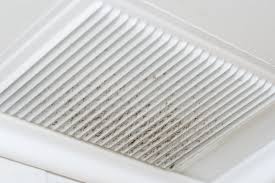
Mould growing on a ducted air conditioning register
Are Some Duct Types More Likely Than Others to be Contaminated?
Historically, most home air ducts systems were constructed from sheet metal, however in more recent times they are being made with a fibre glass duct liner. The benefits of using an insulated duct material like fibre glass, are:
- Improved temperature control;
- Energy conservation;
- Better noise control;
- Lower running costs; and
- Reduction of moisture in system.
Most insulated duct systems can operate for years without mould growth, by keeping them clean and dry. There is an ongoing debate however, as to whether fibre glass is more prone to contamination than sheet metal. Treatment of mould on sheet metal is much easier, as once fibre glass is contaminated with mould, it generally needs to be replaced.
Are Chemicals Used to Clean Inside the Ducts?
Some air duct cleaning service providers may use a chemical biocide to clean the inside of your ducts from bacteria or mould. However, this is not suitable to use on fibreglass materials, so is only applied to the un-insulated areas of the duct system. Some air duct cleaning providers may suggest using ozone to kill the contaminants; however ozone is a gas, which can irritate human lungs. Both have received criticism in their use, with the major issues listed below:
- Limited research has been conducted on the effectiveness of chemical biocides or ozone on duct work; and
- Some people may react negatively to the chemicals and have allergic reactions.
The products discussed above can only be used to sanitise the surfaces of sheet metal ducts. In recent years, there has been a move towards using natural products based on tea tree oil, as a more effective and safe option.
Why may a Sealant Used after Cleaning the Air Ducts?
Air duct cleaners may use a sealant after cleaning the air ducts to prevent the further release of dust and dirt into the air. As with the biocides, a sealant is often applied by spraying it into the operating duct system. Research has shown that using this method does not effectively coat the duct surface and may also affect the noise and fire resistance of the fibre glass material. It sometimes may invalidate the manufacturer’s air conditioners warranty as there are still unanswered questions about the safety and effectiveness of sealants.
Interested to know more about air duct cleaning or are you looking at booking a service for your air conditioner? Get in touch with our friendly Compare Air Conditioning team on 1300 741 451.
What is the duct cleaning process?
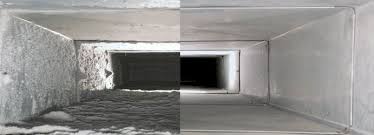
It is estimated that almost 20 kilograms of dust can be collected in a single household each year, with around a third of it is estimated to end up in your ducted air conditoning system. This is a major source of indoor air pollution and effects the quality of air you breathe in your home. Dust, dirt and other contaminants can be sucked into your ducted air conditioner and can build up over time.
They can then be blown through the ducted system and your house every time that you operate your unit. By having your duct cleaned not only help improve the air quality, but will also help to lower your energy costs, get rid of smells and odours and reduces the risk of fire caused by the build-up of dust on the motor.
Recommendations vary in the amount of time that air ducts should be cleaned, with some companies suggesting every 18 months-2 years and others up to 3-5 years. There are several factors that can influence the frequency or need for air duct cleaning, such as where your home is situated, the amount of dust around and whether there are smokers or pets in the home.
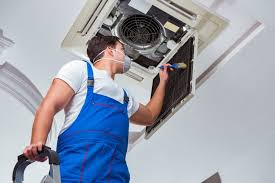
A ducted system being cleaned by an air duct cleaning professional
The Air Duct Cleaning Process
Below is a general example of the duct cleaning process. There may be some variations between companies, however it includes the most commonly performed tasks by duct cleaning companies.
Step 1: A high powered vacuum is used to removed dust and debris from the duct system, with most professional companies able to remove most of the harmful contaminants.
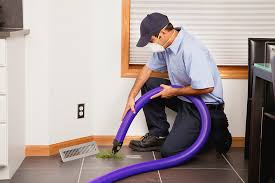
An air duct cleaning professional using a vacuum system to clean the air ducts
Step 2: Using a high pressured compressed or and nozzle dislodges light dust and blows it towards the vacuum.
Step 3: Special brushes scrub the interior of the duct work clean and brush the dirt loose.
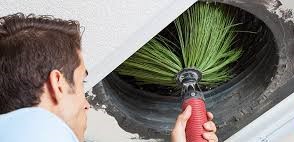
An air duct cleaning professional using a brush during the clean
Step 4: More compressed air is used to blow dirt towards the vacuum. The vent registers and return air ducts are cleaned by using compressed air pressure to blow the contaminants away.
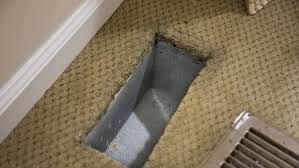
A photo of a floor register (air vent) after cleaning
Step 5: The unit is cleaned, specifically the fan, motor, air filter and other internal parts with compressed air pressure.
Step 6: If there is any indication of mould or other containments a sanitiser is used, in which most companies use an environmentally friendly and natural based one. Commonly a natural tea tree oil-based solution is used as it possesses antimicrobial activity and leaves behind a fresh, clean fragrance.
Step 7: The air conditioner is operated to check the air flow and that it is operating effectively.
The actual duct cleaning process will depend on the severity of the situation; however, most technicians will follow the general procedure above. Air vents are usually covered during the cleaning process as well to limit the chance of dust escaping a to keep your home clean.
If you have decided that an air duct clean may be a good idea for your home or you would like to speak to someone further about air duct cleaning? You may want to call a professional air duct cleaning company or alternatively, please call our friendly Compare Air Conditioning team on 1300 741 451 to discuss air duct cleaning services in your local area
Why clean air ducts?
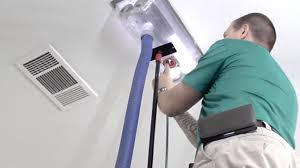
The air duct system of your air conditioner circulates the air around your home, delivering air to each room. Air conditioning ductwork is the piping which is laid either in the ceilings, or walls of your home. This system is quite out of sight out, of mind for most people. However, they do need to be cleaned from time to time. Why? The simple answer is because they get dirty!
Regular air duct cleaning may be more important than you realise because they may not be just circulating air around your home, but also dust, dirt and even mould particles. In addition, there are other factors which may increase the need for duct cleaning such as:
- pets in the home;
- homeowners with allergies or asthma or other sensitivities;
- cigarette smoke;
- home renovations or construction projects inside the home; and
- water damage.
Still unsure whether cleaning your air ducts is necessary? Here are the 5 top reasons why air duct cleaning is important!
- Can Get Rid of Dust Mites and Reduce Allergies
Over time your house will collect dust, dirt, and allergens, which can build-up in your air ducts, polluting the air you breathe with things, like dust mites. Dust mites are a common trigger for human allergies and asthma and can be trapped inside your air ducts, until they are cleaned.
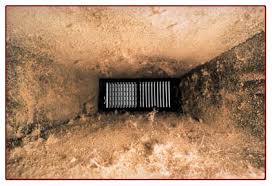
An air duct with a build-up of dust and dirt
- Improves Indoor Air Quality
Indoor air pollution is real and effects the air quality in your home. Indoor air pollution can be contributed to different factors such as inadequate temperature, poor air circulation, ventilation system issues and air contaminates, like dust, mould and bacteria. This poor air quality can impact on your health with symptoms, such as dry and irritated eyes, nose, throat and skin, headaches, coughing, sneezing and sinus congestion. Air duct cleaning can reduce indoor air pollution by removing the dust, dirt, and mould from the duct work. Some professional air conditioning technicians are also able to install an in-duct air purifiers, which sterilises the air by using UV light, in addition to the air duct clean.
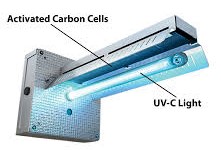
An in-duct air purifier
- Increases the Efficiency of Your Air Conditioning System
A build-up of dust and dirt inside the duct system can impact on the air flow through the pipes, causing your air conditioner to become less efficient and increase its running costs. Air duct cleaning helps maximise efficiency by unclogging the dirt and dust, easing the pressure on the fans and motor.
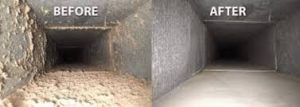
Comparison pictures of before and after an air duct clean
- Refreshes Your Home
An air duct clean ensures that your air conditioner is running effectively and efficiently. Not only that, you will also have the comfort in knowing the air ducts are clean and the air quality inside your home is good. It is particularly important to book a duct clean after renovation or construction, as it leaves a lot of dust and irritants inside the home and ducts.
- Can Save You Money
It is generally recommended that air ducts be cleaned every 3 to 5 years. Contaminants in the heating and cooling system cause it to work harder and shorten the life of your system. A well-maintained air conditioner ensures the effective operation of your air conditioning system, as well as prolonging its longevity and need for ongoing repairs. Even though there are costs associated with duct cleaning, it can save you money in the long term.
Cleaning Your Air Ducts
Employing a specialist company to clean your air ducts is necessary. Different companies may use different techniques to clean the ducts, with some using chemicals or a filtered vacuum system. Chemical sealants can cause further irritations as the sealants break down over time, which then dust motes will start circulating again through the air ducts. Most professional companies will use a filtered vacuum to clean evaporator coils and vent covers for a safe clean. The vacuum system sucks the dust and debris out of the duct pipes and out of your home.
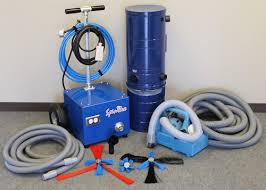
An example of a professional duct cleaning equipment
Periodic air duct cleaning can improve your home’s air quality as well as increase your home’s overall level of comfort, and even save money long-term. Are you interested in knowing more about air duct cleaning, please call our friendly Compare Air Conditioning team on 1300 741 451.
How to check your ducts were cleaned properly
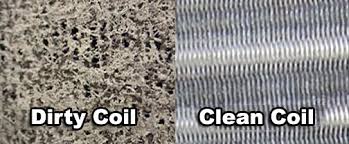
The main way to check that your air ducts have been thoroughly cleaned is to make a visual inspection, which is not always easy to do. Some service providers use remote photography to document conditions inside the ducts and then show them to their customers. If you can make a visual inspection, try to ensure that all parts of the system are visibly clean, with no debris. If you can see any dirt or debris, the ducts are not sufficiently clean.
Below is a checklist of things to notice, which will suggest that a thorough job has been performed and your air ducts are clean.
- The technician gained access to and cleaned the entire air conditioning unit including ductwork and other components like drain, pans, humidifiers, coils and fans;
- The heat exchanger surface is visibly clean;
- Both sides of the cooling coil is visibly clean;
- The coil fins are straight, evenly spaced and not bent out of shape;
- The coil drain pan is clean and draining properly;
- The blower blades are clean and free from oil and dirt;
- The return plenum is free from dust and dirt;
- The supply air plenum is free from moisture and mould;
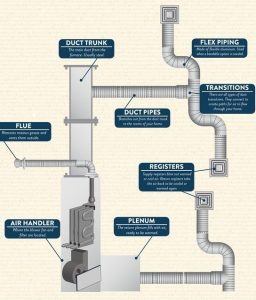
A diagram of the main parts of a ducted air conditioning system
- The air filters are fitted correctly and are the type as recommended by the manufacturer;
- The inside of the duct work is free from dirt; and
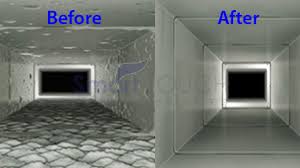
An example of an air duct before and after an air duct clean
- The fibre glass insulation or liner is in good condition and damage free.
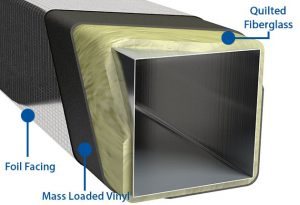
An example of a fibre glass insulated air duct
A proper air duct clean requires technicians to cut a small hole in the ductwork. After the cleaning is complete, the hole is closed and completely sealed. All access door in the sheet metal ducts should also be reattached securely, so that there is no leakage through access door or covers, whilst the system is in operation.
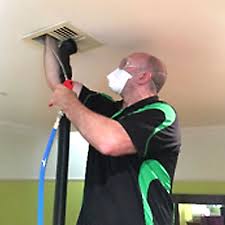
An air duct cleaning technician at work
The duct cleaning process also includes removing, cleaning, and replacing each of the register covers in your home. If your registers are still dirty after an air duct clean, your air ducts might still be dirty. The registers, grilles and diffusers should also be cleaned and securely reattached to the walls, floors or ceilings.
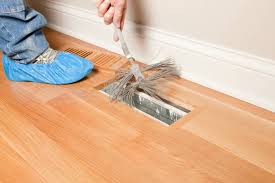
The cleaning of a floor register (air vent)
It is very important that the ducts are fully cleaned as any leftover dirt can limit airflow and potentially lowering the air conditioner’s efficiency and raising your energy bills. Also, dirty ducts, from dirt as well as mould growth, can impact on the health of the home’s occupants, by affecting the indoor air quality. After a through clean, the air conditioner should be operating effectively in both heating and cooling mode.
A proper air duct clean will include most of the things mentioned above. For more information about cleaning ductwork or preventing contamination, contact your local ductwork service provider or get in touch with our friendly Compare Air Conditioning team on 1300 741 451 and book a service today!
How to choose a duct cleaner company?
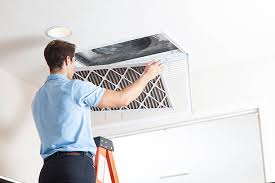
If you see dust blowing from your cooling and heating vents, or if your ducted air conditioning system seems to be working less efficiently than before, it may be time to hire a professional air duct cleaning company. While there are many options of air duct cleaning companies, it’s important to choose the right one to ensure the best results.
Finding it difficult to choose an air duct cleaning company? Here are some suggestions on how to choose a professional air duct cleaning company:
- Conduct some research on companies that provide duct cleaning services in your local area;
- Talk to different service providers and get written quotes before deciding whether to have your ducts cleaned;
- Check customer testimonials and Google reviews for potential duct cleaning companies, to be sure past customers were satisfied and did not experience any problems with their heating and cooling system after cleaning;
- Check out each individual company’s website to see what the company has to say about their duct cleaning services, their prices, and the length of time they have been in business;
- try to find a company that has been in the business for several years;
- check the company has proper insurance to cover any kind of damage that could occur during the cleaning.
If you need any assistance in finding a reputable air duct cleaning company, please call our friendly Compare Air Conditioning team on 1300 741 451 to discuss air duct cleaning services in your local area.
What to expect from a duct cleaning professional?
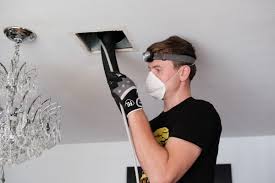
If you have decided to employ a professional air duct cleaning company to clean your air ducts and really are not sure what to expect, read on further to find out more! There may some variations between companies based on their pricing, cleaning solutions they use and the tasks they complete, however the air duct cleaning process is generally quite the same.
Below is a list of the main tasks an air duct technician will perform during his visit. Before the cleaning begins, the technician should inspect the air ducts, looking at:
- The extent and type of the build-up. If your ducts have a moisture problem, for example, a different cleaning method may be needed than if the technician was removing simple dust; and
- Ensuring that there is no asbestos-containing material (i.e. the insulation) in the air conditioning system. If asbestos was found, a specialised company and procedures will need to deal with this, before air duct cleaning can take place.
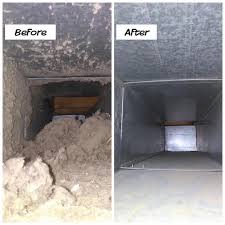
A before and after photo of an air duct which has been cleaned
After the inspection has been completed, the technician will start the cleaning process, which should include:
- Sealing off the duct system, by covering all the system openings to limit dust and debris being blown around the house;
- All access ports or door will be opened to allow the entire system to be cleaned thoroughly;
- The technician will use an industrial vacuum equipment to sucks all of the dirt and debris out of the air ducts;
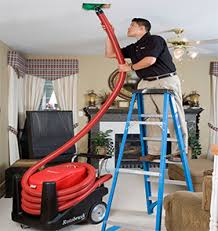
An air duct cleaning specialist using a vacuum to suck out the dirt and debris from the air duct;
- A special brush is used to dislodge any hard dust or debris, whilst the technician is using the vacuum equipment;
- Care will be taken to protect the duct work, which includes sealing or re-insulating any access holes, to ensure that they are air tight;
- Remove all supply and return registers to clean and disinfect grills. All holes will be sealed during the cleaning process except the one duct run being cleaned;
- Both supply and return plenums should be cleaned;
- Evaporator coil should be assessed and cleaned as needed; and
- If the ductwork has moisture or unwanted organic growth, like mould, your technician may suggest treating these issues as well. The mould will be removed completely and the area where it was is cleaned thoroughly, with an antimicrobial sealant applied.
Once the cleaning itself is complete, some companies will issue a Certificate of Cleaning. The technician may also provide a written or verbal list of ways that you can promote the health of your ducted air conditioning system. These tips help keep your unit in good condition and provides better in-home air quality. Some suggestions that the technician may provide, include:
- Installing better quality air filters;
- Changing air filter more frequently; and
- Suggesting a routine maintenance and service of the air conditioning system.
Part of using a professional air duct cleaning company is that you expect a certain level of technical knowhow and skills, such as:
- The technician will have a good knowledge and understanding of cleaning air ducts;
- The technician will have the proper qualifications and experience to ensure proper cleaning;
- The company will be fully insured and certified.
- The technician will be an expert in duct cleaning, using the latest equipment for duct cleaning;
- Professional companies will be up to date and using the most eco-friendly cleaning solutions; and
- Apart from cleaning, many professional and certified companies can provide maintenance and repair services as well.
If you have decided that an air duct clean may be a good idea for your home or you would like to speak to someone further about air duct cleaning? Please call our friendly Compare Air Conditioning team on 1300 741 451 to discuss air duct cleaning services in your local area.
Why choose a professional to clean your ducts?
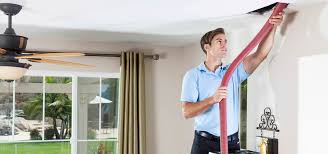
Are your air ducts in need of clean? Are you unsure whether you can try and clean them yourself or if you need a professional air duct cleaner? Read on, to find out more!
There are several reasons why you should hire a professional air duct cleaning company or technician to clean your air ducts. Some of these reasons include:
- Professional duct cleaners can ensure a complete and professional clean, helping to free your home of allergens and dirt in your ductwork
- They will have proper knowledge about cleaning agents that are required in the cleaning process;
- Professional air duct cleaners will be well-trained and knowledgeable cleaners, who can provide a thorough duct cleaning service;
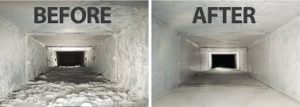
A before and after photo of an air duct that has been cleaned by a professional
- Professional companies and technicians are fully insured and often offer a satisfaction guarantee on their work;

- Professional companies and technicians are usually certified and experienced
- Professional air duct cleaning can increase the efficiency of your air conditioning system and reduce running costs;
- To thoroughly clean air ducts often requires a wide variety of cleaning supplies and special equipment that only a professional has;
- A qualified air duct cleaning professional removes all allergens, dust, grime, and dirt from your air ducts using environmentally friendly products which will not impact on the air quality of your home or the health of your family;
- Some professional companies will be able to issue a Certificate of Cleaning or a service warranty on their services;
- Professional companies offer services that are carried out according to strict industry standards to ensure their customer’s health and safety; and
- By using a professional company or technician you are limiting the risk of damage or mistakes which could damage your air conditioning system.
If you have decided that an air duct clean may be a good idea for your home and you would like a professional air duct cleaning company to provide the service, please call our friendly Compare Air Conditioning team on 1300 741 451 to discuss air duct cleaning services in your local area.


